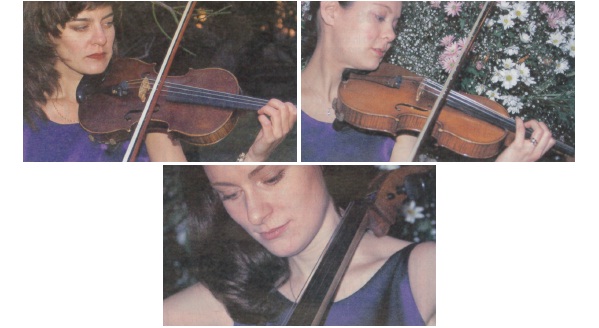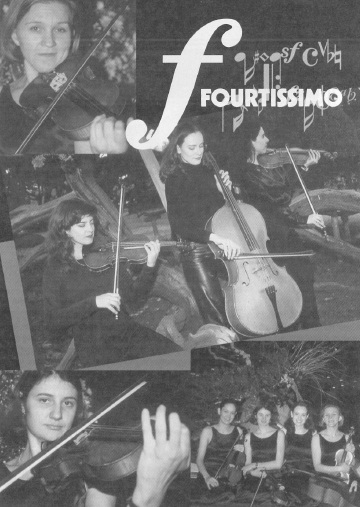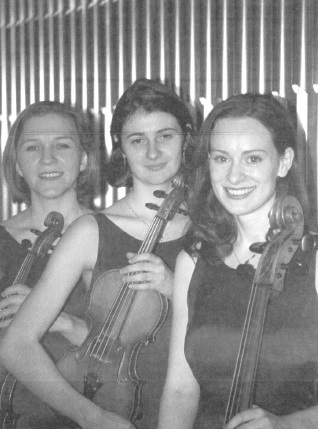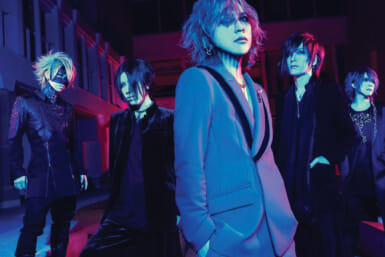By Jim Merk
Photos by Dov Friedmann
Masterful performances of your favorite composers are a delight to the ear, while lovely ladies dressed in splendid purple gowns are, of course, pleasing to the eye. This combination does describe Fourtissimo but, like all truly delightful things, there is more than meets the eye… or ear, for that matter. Fourtissimo is an inspiration—aesthetically, artistically and even economically. To me they symbolize a special time and place that is Tokyo in the dawn of a new millennium.
Tokyo has always been special, even when its vibrancy was in large part thanks to a permissive America regarding Japan’s closed markets. The U.S. needed a strong ally situated near the USSR, and Japan played its part in exchange for the chance to create the world’s second-largest economy.
Years later, facing up to the need to change and become competitive in the international marketplace playing by international rules has meant an openness to ideas and concepts simply inconceivable a mere decade or so ago; this makes today’s Tokyo a place where bold new ideas are taking root. You know this, though, if you have read any editions of Weekender in the past year or so. It truly is, as Citigroup head John Plum told me, “A once-in-a- multigenerational moment in history.” Fourtissimo shows us this rather grand statement applies to tilings beyond the financial industry, too.
Stop and think for a moment of how naive this group appears. Tokyo is a city boasting 12 major orchestras. Read any pundit (except for dear Scott-Stokes) and know this city is in year nine of a recession. Is this the time or the place to start a career as part of a classical quartet? Yes, if you happen to be part of the one calling itself Fourtissimo.
Fourtissimo is the brainchild of Alison Noonan—singer and cellist extraordinaire. Coming to Tokyo following graduation to seek fame and fortune, she began by registering with talent and music agencies and getting work at weddings and other events. Not too surprisingly, the amount of work wasn’t enough to support a Tokyo-based lifestyle. In her chosen field, the number of competitors is staggering; a solo cellist—even one with singing chops—simply doesn’t get enough work. Instead of withdrawing from the market, she pursued die unlikely course of expansion.
After thinking over a suggestion that an all-foreign female quartet might get more work, Noonan decided to give it a try. She knew of two other musical freelancers in town, but wasn’t sure they had the musical chops or even the desire to hook up. She knew that success would hinge on ensuring consistent quality performances, so ability was, of course, key.
That first version of the group was much like any other quartet; well, quite naturally it consisted of four people. Noonan decided upon the eye-catching purple dresses (a great branding strategy) and started booking performances.
Soon, though, the realities of the ex-pat life cycle caught up with the group as the first violist moved back home. Noonan faced the reality that her initial expansion wasn’t enough; she needed more players. Recruiting talented performers who could wear the purple dress became a top priority.
Amazingly, she was able to find quite a few. She solidified the concept that Fourtissimo would be whatever the client demanded—a trio, quartet, ensemble or even a solo act—to meet any social or musical need. Noonan was Charlie, Bosley and Angel all wrapped up into one. Today, she has as many as nine performers who can do her clients’ bidding, which, of course, always comes down to playing master works. Charlie never had it so good.
The dedication required to master a stringed instrument such as the cello or violin is no small consideration. People can scratch for years before getting a decent tone—most never achieve that feat (Jack Benny’s comic alter ego comes to mind). Getting an instrument to sing, then being able to render a piece such as those composed by Beethoven and the like in a polished performance, requires nothing less than a lifetime commitment. Even taking that as a given, Fourtissimo’s musical angels are a striking bunch.
■Alicia, for example, performed for 12 years in the San Diego Symphony Orchestra before her husband’s work brought her to Tokyo early last year.
■Alia (violin), a Belarussian, graduated from the state conservatoire and now teaches violin in Ebisu.
■Fiona (violin) is a British music graduate with a Masters degree in orchestral playing and experience performing with London orchestra.
■Amy (violin/viola) is another British music graduate who played in various music ensembles in Jakarta before moving to Tokyo. The list goes on, but you get the idea.
These are not ordinary women, nor ordinary musicians. Putting them on the job means employing some of the best in the business. Angels, indeed.
It also means the women aren’t content with the ordinary. Noonan tells me that she hopes literally to electrify the performances with amplified and, perhaps, synthesized instruments. Just imagine: “Following today’s performance of Bach’s Fugue in G minor, we will play our version of Led Zepplin’s ‘In Through the Out Door’.” Drew Barrymore would be so proud. The thing is, in Tokyo the idea will probably work.
Why? Because it is a cool idea. It would be yet another dynamic that sets Fourtissimo apart, and helps them land work. As it is now, you don’t think of Fourtissimo as a string quartet. Those are the groups who wear black tuxes, play quietly and fade into the background, hopefully, adding a touch of classy ambiance.
On the other hand, when Fourtissimo plays an event, whether it be a wedding or other special occasion, they are noticed. Even if they play the same songs the quartet would have played, the songs take on a new importance. The musicianship, the nationalities and, of course, the purple makes guests wonder, “Who are they?” as opposed to thinking, “Oh, a string quartet.” That difference is critical. In a way, it is what the pundits are missing about Japan.
Should your life’s pursuit be that of a pundit, you might start by studying economics. There you will learn to read and evaluate statistics. If you then decide to study statistics, you will learn that interpreting statistics is not a science and making predictions using numbers is foolhardy at best. Need I say “Presidential election” as evidence? Statistics won’t show you chad (hanging or pregnant), ballot design or Supreme Court rulings. Yet, those are the differences between President-elect Bush and lame-duck Vice President Gore.
It seems, when it comes to reporting on Japan, pundits are looking at the numbers, the lists. On a list Fourtissimo is a string quartet; you miss the difference that sets them apart.
Interpreting Tokyo’s numbers today is probably analogous to looking at Fourtissimo when they hired the photographer, bought the dresses, decided to grow in number to nine potential players. It can be pretty depressing. It is not, however, the end of the story.
These days Fourtissimo plays about a gig a week—four times what they were doing last year. Alison also reports that many clients call back for repeat performances. It is a solid foundation upon which to grow. It took some time, but it looks like they are going to make it. Just like Japan? To those of us noticing the purple dresses, almost certainly.











